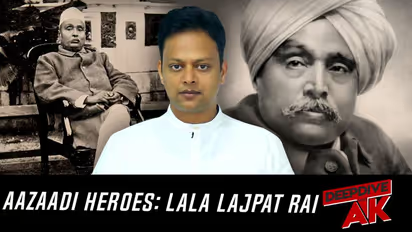
The tyrannical British rule in India was the reason for many unrests in India. We have seen millions of Indians taking to the streets for our freedom. So believed in a moderate approach where they pleaded the British to mend their ways, the others adopted radical measures as they believed only resisting the British could give us freedom. Among this extremist faction was the Lal-Bal-Pal triumvirate who came together and became pioneers of the Swadesh and Boycott movement as they rejected purchasing British goods and they believed that it was self reliance hat will help us attain freedom. Abhinav Khare deep dives into the story of “Punjab Kesari” Lala Lajpat Rai, one third of the famous Lal-Bal-Pal.
Also read: Deep Dive with Abhinav Khare: Bhikaji Cama, the woman who fought for India's freedom abroad
He was born in undivided Punjab on the January 28, 1865. He always believed in India being self-sufficient. He started the Punjab National Bank - the first Indian Bank which was started completely with Indian Capital.
On the fiftieth anniversary of the 1857 revolution, the British feared another revolution in 1907 and it is said that the entire nation was just waiting for Lajpat Rai’s orders to start the agitation. The British thought that the Arya Samaj, of which Lajpat Rai was a member, was secretly organising this. The telegram which informed the officials of the same read as:
“The head and centre of the entire movement is Lala Lajpat Rai, a Khatri pleader who has visited England as the Congress representative of the Punjab. He is a revolutionary and a political enthusiast who is inspired by the most intense hatred of the British Government.”
So, as a preventive measure, he was deported to Mandalay in 1907. Lajpat Rai did not believe that German's help for our freedom was beneficial. He said, “I am an Indian patriot and I wish freedom for my country. I have no sympathy for the Germans nor have I anything against them. … I have been always rather fanatically attached to the theory that liberty won with foreign help was not worth having.”
He was a true secular at heart and he believed that the tension between Hindus and Muslims were artificially created by the British. He believed that the British have planted the seeds of secession and communalism among Muslims and Sikhs in our country.
He said, “What we aim at is not the merging or the absorption of one into the other, but the integration of all into one whole, without in anyway injuring or lessening each group individually. Hindus. Muslims, Christians, Sikhs, Jains will not have to cease to be such in order to be Indians. Let them but recognize themselves to be Indians as well as Muslims, Christians etc., let them think themselves as Indian Muslims and Indians Christians, and then all will be well.”
He was not just a freedom fighter; he was also a social reformer. He believed that the system of caste and untouchability was an anti-thesis to that. When people said that caste is a religious issue and should not be on Congress’ agenda, he said:
It is useless to talk of a democracy as long as this kind of prejudice (untouchability) sways our mind and influences our conduct towards those from whom we differ in religion or whose forms of occupation we dislike. … The process of building a nation is a moral process. You cannot engage in work of this kind with success by practicing duplicity. It is sufficiently humiliating that we should have to mention untouchability at all in our programme; but to have avoided it for fear of offending the sensibilities of some classes of our countrymen would have been even worse. It would have been immoral.”
It was on October 30, 1928, Indians took to streets in Lahore to protest against the Simon Commission. It was a non-violent protest but the police targeted him and lathi charged at him. Even at this situation, he said, "Every blow that they hurled at us drove one more nail into the coffin of the Empire."
He succumbed to his injuries on November 17, 1928.
A visionary, patriot, freedom fighter and a person who taught India to be self-reliant, we owe both our independence and democracy to this man!
About Abhinav Khare
Abhinav Khare is the CEO of AsiaNetNews Network and also the host of a daily show named Deep Dive with AK. AsiaNetNews is a leading media group of south India with highly valuable brands like AsiaNetNews, Suvarna News, Kannada Prabha, IndigoMusic, Indigo Radio, MyNation, NewsFast, IndigoXP Music lounges.
He is a proud father of two beautiful daughters and resides in Bengaluru with his loving family and a lifetime collection of books and gadgets. An avid traveller, he has already pinged more than hundred cities from 5 major continents around the globe.
A tech entrepreneur, who is passionate about policy, technology, economy and philosophy from ancient India. His favourite pastime is to research synergy between these facets of society. He earned his qualifications from the top 10 global universities; an MS Engineering from the ETH Zurich and an MBA Finance from the London Business School.